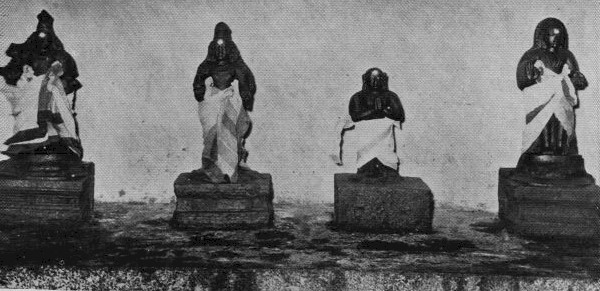
The Although it is widely agreed that Maanikkavaacakar
lived in the 1st millennium CE, there is dispute as to the exact
placement of his period. Many scholars are of the opinion that he came in after the time
of the Naayanmaars i.e. after 9th century CE. Certain scholars however
place him prior to the period of the Nayanmaars (5th to
6th century CE). It is interesting that Sundaramoorthy Naayanaar does not
mention him in his Tiruttondattogai, praising the 62 Saivite Saint Poets who preceeded
him. Likewise, Maanikkavaacakar makes no mention of the Naayanmaars
in any of his works.
Maanikkavaacakar was born in Tiruvaadavur near Madurai, in the Pandyan
kingdom to Sambhupaadasritar and Sivagnanavati. The name
given to him at the time of his birth is not known. He was generally referred to as Tiruvaadavuraar.
Tiruvaadavuraar mastered the scriptures and the secular arts at the age of sixteen, and
was appointed to the position of a chief minister, by the then Pandya
ruler. The young minister proved his administrative skills although his heart longed for a
spiritual pursuit.
A series of miracles happened in the life of
this saint poet, as he embraced a life of renunciation. Two of these miracles are narrated
in the Tiruvilayaadal Puraanam of Madurai,
and these miracles are relived through enactment during the Aavani Moolam
festival at the Madurai Meenakshi Sundareswarar temple.
The poems penned by the saint are regarded with utmost respect in the
South Indian Saivite tradition, and
these formed the basis of the later to come Tiruvarutpaa by the Saint
Poet Raamalinga Adigalaar. Maanikkavaacakar travelled around the Tamil country,
particularly the Pandya kingdom. Uttarakosamangai,
Madurai, Tirupperunturai are the shrines
that are associated with him in particular. Maanikkavaacakar composed his
Tiruvempaavai at Tiruvannaamalai,
and he held the deity at Chidambaram
in great regard. It is believed that he miraculously merged into the sanctum at Chidambaram
(also see the story of Aandaal).